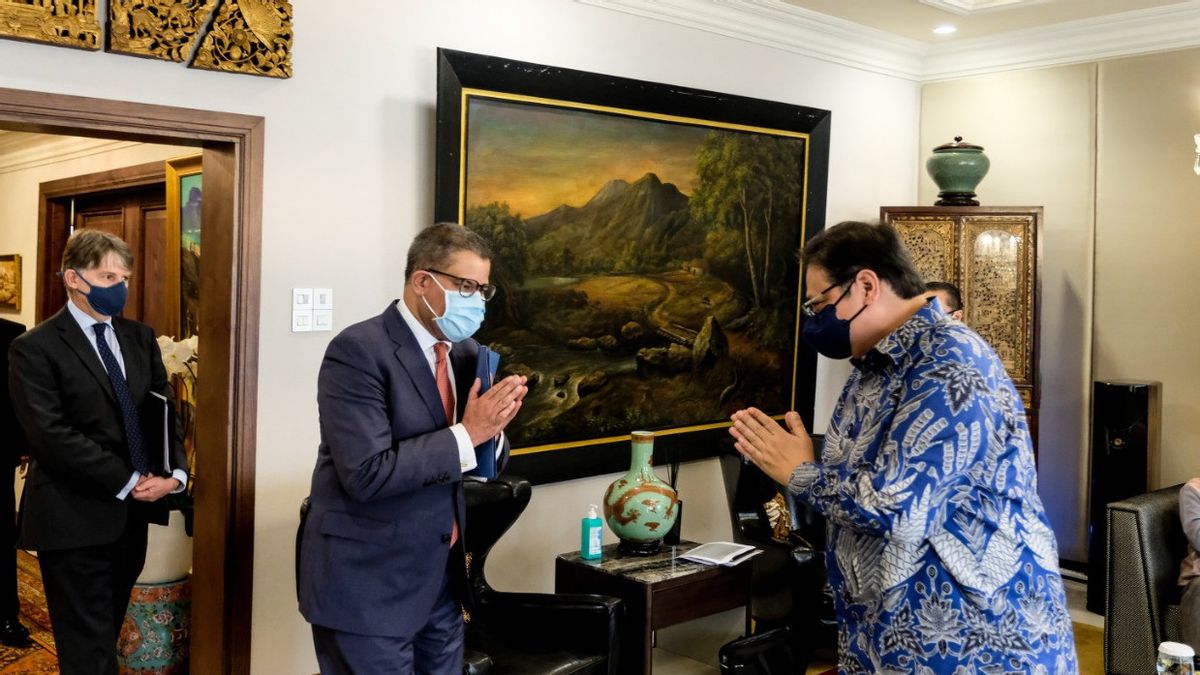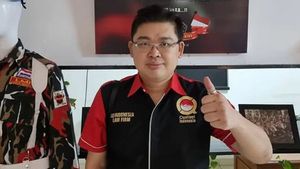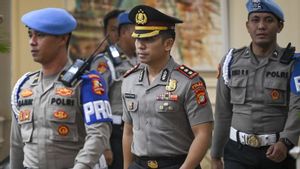JAKARTA – Sustainable agriculture is a necessity for now. Agriculture that is oriented towards sustainability and sustainability. The Coordinating Minister for the Economy of the Republic of Indonesia, Airlangga Hartarto, received praise for this sustainable agriculture from several of his guests.
"I am happy that the UK recognizes Indonesia's strength which is committed to implementing sustainable agriculture and commodity trade as well as strengthening bilateral cooperation, especially in the field of climate change," said Airlangga Hartarto in a release to the VOI editorial team on Tuesday, June 1.
The Coordinating Minister for the Economy of the Republic of Indonesia, Airlangga Hartarto received a visit from Alok Sharma, President Designate of the United Kingdom for COP26 (Climate Change Conference of the Parties). The meeting was held on Tuesday 1 June in Jakarta. The meeting was attended by HMA Owen Jenkins, UK Ambassador to Indonesia and Timor Leste and Ken O'Flaherty, COP26 Regional Ambassador for Asia-Pacific and South Asia.

They discussed several issues related to the COP26 Forest, Agriculture and Commodity Trade (FACT) Dialogue in which Indonesia was the Co-Chair with the UK. In addition, Indonesia's preparation, readiness and participation to support the success of the COP26 Conference in Glasgow, UK on November 1-12 2021. In the implementation of COP26, the UK is partnering with Italy, which this year serves as the G20 Presidency.
Airlangga Hartarto in his speech thanked the British government for trusting Indonesia to become the Chair of the Joint Dialogue on Forest, Agriculture and Commodity Trade (FACT) with the UK.
Airlangga also welcomed the discussion from the FACT Ministerial Roundtable Meeting in April. In particular on collaborative arrangements that allow countries to work together and develop roadmaps for action.
This meeting will be a good opportunity for Indonesia to discuss the Co-Chairmanship, Indonesia and the UK on Forestry, Agriculture and Commodity Trade Dialogue (FACT). In addition, how the two leaders can play their roles in directing this dialogue for the best interests of all parties.
“I would like to reaffirm Indonesia's commitment to strengthening dialogue. As Co-chairs, we need to share the same vision and understanding that will lead to mutual benefits as equal partners," said Airlangga Hartarto.
Global Pandemic COVID-19
The world is now faced with various challenges exacerbated by the unprecedented Global COVID-19 Pandemic. It is therefore very important to collaborate to restore the economy and achieve sustainable development goals, including significantly reducing carbon emissions.
It is important for participating countries to take advantage of the FACT Dialogue to find common solutions in pursuit of efforts to promote sustainable goals, without compromising the essential need for economic recovery.
All parties must be able to keep FACT away from focusing on commodities and products only, such as palm oil, soybeans, beef, and others. The FACT Dialogue must find a holistic solution between consumer and producer countries in the overall agricultural and commodity trading system. This includes enhancing existing sustainability efforts and paving the way for innovation.
In particular, Airlangga underlined that the two countries need to work towards reaching a global consensus at COP26 in Glasgow next November. The discussion at the FACT Dialogue, according to Airlangga, should provide a better understanding of the various and complex challenges ahead.
“We have to work towards collaboration and cooperation that will lead to inclusive collective action rather than focusing on differences. We need a new “narrative” beyond certain “bad” commodities, and help present a balanced picture of the concrete efforts of producing countries in developing sustainable agriculture and commodity trade,” said Airlangga.
Indonesia's Commitment
On that occasion Airlangga also emphasized that Indonesia has always been a committed and active global player in protecting the environment and biodiversity, to stop the adverse effects of climate change and pursue programs to alleviate poverty, which is also important for the success of achieving these goals.
“Indonesia is ready to lead by example on the issue of climate change. Transparency, accountability, traceability and research-based schemes have become the basis for our search for sustainability," said Airlangga who is also the General Chair of the Golkar Party.
Regarding climate change, Indonesia is at the forefront and on the right track to fulfill its Nationally Determined Contribution (NDC) and Indonesia's efforts to achieve the targets of the Sustainable Development Goals (SDGs) and its national interest to achieve sustainable development.
Through the NDC, Airlangga stated that Indonesia has committed to reducing greenhouse gas (GHG) emissions by 29%, through business as usual and 41%, with international support, by 2030.
"Currently, we are on the right track and optimistic to achieve the 29% reduction target, however, we are still struggling to achieve the 41% reduction target due to the lack of international assistance such as finance and technology," Airlangga added.
Government and Private Synergy
Indonesia has adopted and implemented several initiatives on sustainable practices, such as the Timber Legality Assurance System (SVLK), Indonesian Sustainable Palm Oil (ISPO), and the Sustainable Natural Rubber Platform (SNARPI), which are private initiatives but with full government support. "We are working on the development of other certifications that are similar but integrated schemes for other commodities," said Airlangga.
The Government of Indonesia also appreciates the ongoing cooperation between Indonesia and the UK in the area of the Strengthening Sustainable Palm Oil Program in Indonesia (SPOSI). This program aims to increase and develop sustainable palm oil production by strengthening the capacity of smallholders and increasing the acceptance of Indonesian sustainable palm oil products in the international market.
Smallholders are important key players in Indonesia's palm oil industry. In 2018, smallholders contributed almost half (5.6 million hectares or 46%) of the total oil palm plantation area and produced 12.7 million tonnes (or 37%) of crude palm oil in Indonesia.
The government has issued a Presidential Decree to improve the Indonesian Sustainable Palm Oil (ISPO) certification standard. In addition, the Government of Indonesia has also issued a National Action Plan for Sustainable Palm Oil. Action plans have been formulated and developed by multi-stakeholders in a transparent and balanced dialogue process.
Request English Support
Indonesia asks the British government for support in countering the negative campaign against Palm Oil and its derivative products in Europe because it is counter-productive and only sets a negative tone.
Airlangga also understands that the UK Department of Environment, Food and Rural Affairs (DEFRA) is proposing to introduce due diligence requirements for companies wishing to import palm oil. This policy will be based on the Global Reporting Initiative (GRI) standards for due diligence.
The efforts of the British Government to indirectly impose voluntary reporting standards on Indonesia's leading agricultural exports are non-tariff barriers that are discriminatory, unfair and unnecessary.
In the end of his speech, Airlangga expressed his gratitude for the UK's invitation to become the Co-Chair of the FACT Dialogue to share visions and actions on the ground towards sustainable landscape management, including forestry and agriculture.
"I am ready and remain committed to working with you and the UK Government on the issue of climate change and bilateral economic cooperation between Indonesia and the UK," said Airlangga.
The English, Chinese, Japanese, Arabic, and French versions are automatically generated by the AI. So there may still be inaccuracies in translating, please always see Indonesian as our main language. (system supported by DigitalSiber.id)













